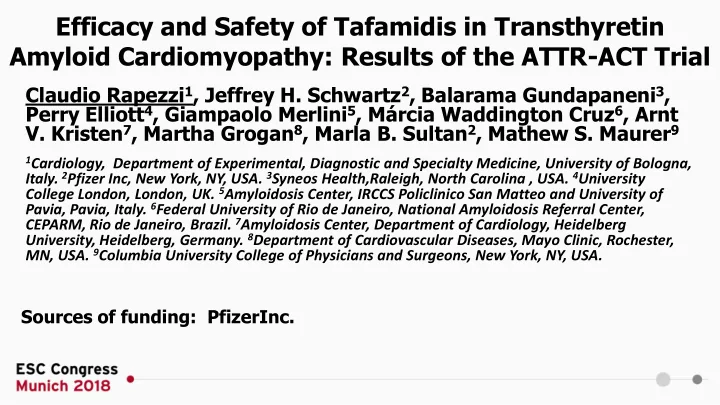

Efficacy and Safety of Tafamidis in Transthyretin Amyloid Cardiomyopathy: Results of the ATTR-ACT Trial Claudio Rapezzi 1 , Jeffrey H. Schwartz 2 , Balarama Gundapaneni 3 , Perry Elliott 4 , Giampaolo Merlini 5 , Márcia Waddington Cruz 6 , Arnt V. Kristen 7 , Martha Grogan 8 , Marla B. Sultan 2 , Mathew S. Maurer 9 1 Cardiology, Department of Experimental, Diagnostic and Specialty Medicine, University of Bologna, Italy. 2 Pfizer Inc, New York, NY, USA. 3 Syneos Health,Raleigh, North Carolina , USA. 4 University College London, London, UK. 5 Amyloidosis Center, IRCCS Policlinico San Matteo and University of Pavia, Pavia, Italy. 6 Federal University of Rio de Janeiro, National Amyloidosis Referral Center, CEPARM, Rio de Janeiro, Brazil. 7 Amyloidosis Center, Department of Cardiology, Heidelberg University, Heidelberg, Germany. 8 Department of Cardiovascular Diseases, Mayo Clinic, Rochester, MN, USA. 9 Columbia University College of Physicians and Surgeons, New York, NY, USA. Sources of funding: PfizerInc.
Declaration of interest • Study supported by Pfizer
Background • Transthyretin-related cardiomyopathy (ATTR-CM) is an under- diagnosed, life-threatening disease characterized by accumulation of amyloid fibrils in the heart leading to restrictive cardiomyopathy and progressive heart failure • ATTR-CM is caused by pathogenic mutations in TTR (ATTRm, the hereditary form), or by deposition of wild-type protein (ATTRwt, the acquired form) • Treatments have been limited to supportive care, with no guideline-based recommended treatment, and the median survival of untreated patients is only around 3.5 years after diagnosis • Tafamidis, an orally active drug, stabilizes transthyretin and inhibits or slows down the formation of amyloid fibrils
Purpose and key points about methods • To assess the efficacy, safety, and tolerability of an oral dose of 80 or 20 mg tafamidis meglumine in comparison with placebo for 30 months in 441 patients with hereditary or wild-type transthyretin amyloid cardiomyopathy and heart failure • Primary end point: combination of all-cause mortality and frequency of cardiovascular-related hospitalizations (A particular statistical method−Finkelstein– Schoenfeld − was adopted to preserve the higher importance of the all-cause mortality endpoint allowing later CV- related hospitalizations to remain informative) • Key secondary endpoints: change in 6-minute walk test and in quality of life
ATTR-ACT Study Design • Patients randomized 2:1:2 to tafamidis 80 mg, tafamidis 20 mg, and placebo • Stratification for genotype (wild-type or variant) and disease severity (NYHA class)
Results Compared with placebo, tafamidis demonstrated : • a significant reduction in all-cause mortality (29.5% vs 42.9%; hazard ratio [HR] 0.70; 95% confidence intervals 0.51 – 0.96; p=0.0259) and cardiovascular-related hospitalisations (0.48 per year vs 0.70; relative risk reduction 0.68; 95% CI 0.56 – 0.81; p<0.000 • an improvement in quality of life and exercise tolerance (reduction of the decline in the 6MWT distance and KCCQ-OS score ) • No significant safety concerns The extent of the tafamidis benefit was independent of aetiology (wild type vs hereditary) and drug dose (80 vs 20 mg)
All-Cause Mortality 30% reduction in the risk of all-cause mortality with tafamidis compared with placebo
Key Secondary Endpoints: 6-minute Walk Test and Quality of life
Conclusions • In patients with ATTR-CM, tafamidis reduced all-cause mortality and cardiovascular-related hospitalizations, and reduced the decline in functional capacity and quality of life. • Tafamidis was safe and well tolerated
Key messages • ATTR-CM is much more underdiagnosed than rare, and can be easily diagnosed when suspected ! • Tafamidis is an effective and safe therapy for this disease and offers hope for patients whose life expectancy and quality of life are extremely limited • Early diagnosis and treatment are essential in this fatal, progressive condition, since the maximal benefits are observed at an earlier, and more reversible, stage of the disease
Recommend
More recommend